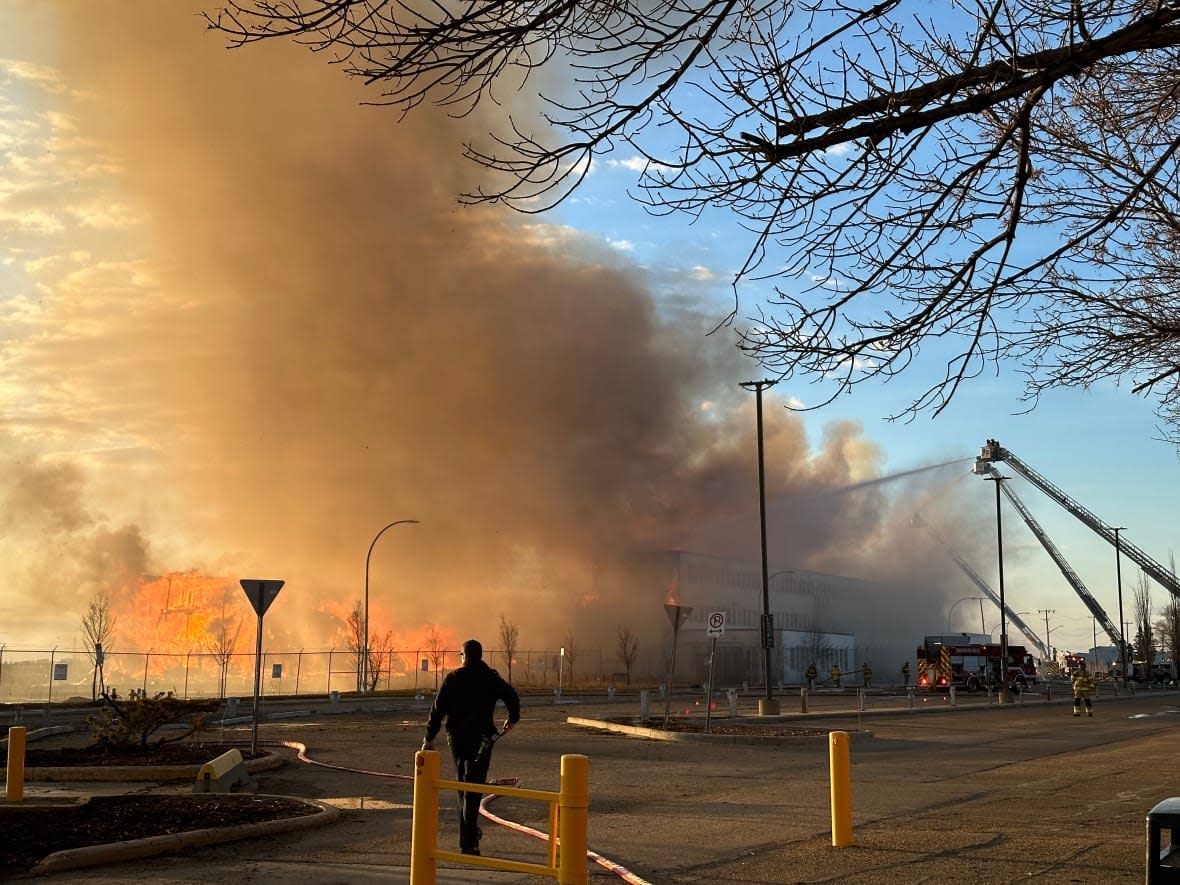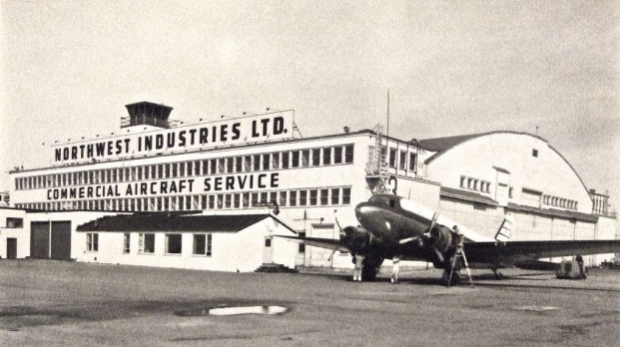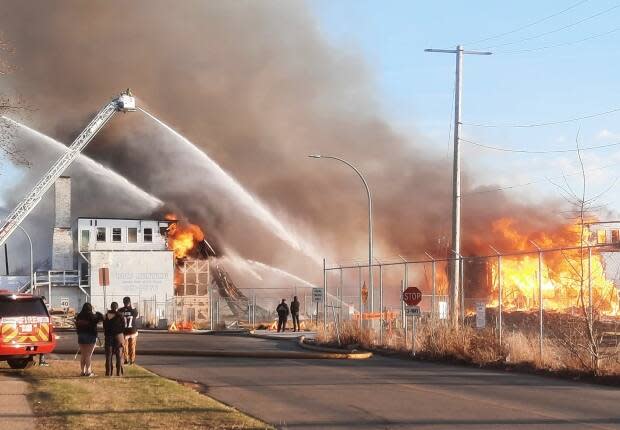Redevelopment plans in question after historic Edmonton air hangar gutted by fire

Edmonton's Hangar 11 property redevelopment project is facing an uncertain future after a historic building on the city's old airfield was destroyed by fire.
The hangar, a remnant of the city's Second World War-era history, was engulfed in flames Monday at around 7 p.m. MT. Edmonton police consider the fire suspicious.
The white wooden structure at Edmonton's Blatchford development was to be restored and would have been the centrepiece of a multimillion dollar mixed-use residential development project.
Tim Antoniuk, an Edmonton design expert and founder of the Hangar 11 project, said seeing the building gutted was heartbreaking.
He got a call about the fire late Monday evening and arrived on site just north of Edmonton's downtown as the structure collapsed.
"For me, things like this are far more than a building or a piece of architecture or the materials they're made of," he said in an interview with CBC News Tuesday.
"They represent heritage and history and people.
WATCH | Fire breaks out at former Edmonton airport:
"It is one of the most important historic buildings in Canada, not just Edmonton."
The building, which once served as a critical supply hub during the Second World War, is irreplaceable, Antoniuk said.
He is unsure of what comes next for the site or the redevelopment plans.
"It just incinerated instantly," he said.
"Nobody could have thought that something this devastating could happen this quickly."
Antoniuk said he struggled to find investors for the project over the years but had begun to make real progress on construction. Preparations were underway to break ground this summer, he said.
He said he had recently teamed up with a large development firm based in Austin, Texas, to make the project a reality and turn the building into student housing with food, commercial and art space.
The development group had just purchased the building from the city for $1.5 million, Antoniuk said. The redevelopment project, which would have housed about 250 people, was expected to cost at least $40 million, he said.
Officials with city administration confirm the property was sold on April 3.
Mary-Ann Thurber, a spokesperson for the City of Edmonton, said the site's future rests with the owners and developers.
"It's too soon to know where we go from here," Thurber said in a statement Tuesday.
"Everyone is still reeling from this terrible loss. Many decisions will have to be made in the coming weeks and months."
The hangar was recently added to the municipality's list of historic buildings and the city was ready to contribute $5 million over 10 years toward rehabilitation. That money had been earmarked within the city's historic resources fund but none had been distributed, Thurber said.
What happens to the funds, and the future of the property, will be a decision of the developers, administration and city council, Thurber said.
"From a Blatchford redevelopment perspective, it's both a historical loss and a community loss as there was lots of excitement about what this property could become and how it could further enrich the Blatchford community for residents and visitors," Thurber said.

Hangar 11, constructed in 1942 by the United States Army Air Force, played a crucial role in the war effort, serving as a critical supply link for the front line.
Ryan Lee, curator of the Alberta Aviation Museum, who watched the hangar burn Monday, said it was gutting to see a part of Edmonton history destroyed.
"That building played an important role in Edmonton's aviation history," he said. "A lot of people see it as, maybe a derelict building, but it really tells the story of Edmonton's wartime contribution.
"Hangar 11 is really the only example left of that whole American war effort that was here and very prominent in Edmonton."
Edmonton was the starting point on the Northwest Staging Route, used by the U.S. to send supplies to the Soviet Union to help fight Nazi Germany on the Eastern Front.
The hangar was among a series of buildings that served the supply effort. The airfield helped move thousands of American bombers, fighters and transport planes though Edmonton to Alaska and finally to Russia, in what became a crucial program in the Allied war effort.
The 7,400 square-metre hangar featured bowstring timber trusses and was made from wood, Lee said.
Hangar 14, which now serves as the Alberta Aviation Museum, is the only war-time building left standing on the former airfield.
"It really goes to show just how quickly these things can be lost," Lee said. "There is nothing to save, unfortunately."

The hangar was one of the last remaining buildings of its kind in western Canada, and was considered by the city to be one of Edmonton's most significant historic structures.
While historically significant, the building needed extensive rehabilitation.
The city considered demolishing the hangar to make way for the Blatchford redevelopment project but halted those plans after heritage advocates fought to preserve the building.
In 2021, the city considered keeping the building and leasing the space but determined the project would be too costly. A full restoration of the building at that time was expected to cost between $55 million and $83 million.
Advocates called for the building to be preserved and redevelopment plans soon took shape.
Antoniuk said he got involved in efforts to restore the building years ago out of a desire to save it from demolition and make it something to serve future Edmontonians.
He said he has been speaking with city officials and project partners to determine next steps. He hopes that maybe something can be constructed on the site that honours the history of the hangar.
"It's really devastating to have gone through this for so long and now, I don't even know what to think," he said.
"It's just a completely new plan.
"Can we rebuild this? I don't know, it's a completely left fork that nobody could have envisioned."


